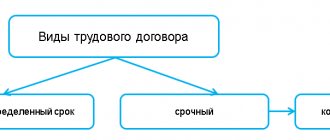Home / Labor Law / Payment and Benefits / Bonuses
Back
Published: 02/15/2020
Reading time: 5 min
0
1240
- Good afternoon. The employer regularly deprives us of bonuses for unimportant reasons: being 5 minutes late, talking in the workplace, etc. As a result, we have never received the income that was promised to us when we were hired. How legal is this?
– Unfortunately for some employees, the employer can independently select the grounds for depriving employees of bonuses. But there are certain grounds when the employer’s actions go beyond the legal framework. Let's look into it in detail.
- Legal grounds
- Is deprivation of bonuses a disciplinary sanction?
- Cases when an employee cannot be deprived of remuneration
- General algorithm for depriving a bonus
- Appealing the decision
- Summary
Where, according to the Labor Code, does the employer establish the procedure for awarding bonuses and depriving them of bonuses?
The Labor Code allows you to set an employee’s salary, making it up of several parts (Article 129):
- payment for the work itself;
- additional payments for special working conditions;
- incentive payments, among which bonuses usually play a leading role.
If the first 2 parts are sufficiently regulated by law, then with regard to establishing bonus rules, the employer can act independently (Article 135 of the Labor Code of the Russian Federation), determining at its discretion:
- quantity, types and, accordingly, a specific list of bonuses paid;
- the frequency of their accrual and the circle of employees who will be entitled to one or another type of bonus;
- a list of those indicators, the fulfillment of which entails the emergence of the right to receive a bonus;
- a system for assessing the value of each type of bonus, the procedure for considering the results of this assessment and a procedure that allows an employee to challenge these results;
- grounds that serve as a reason for depriving an employee of a bonus.
Attention! Hint from ConsultantPlus It will not be a violation if you give an employee a one-time bonus for special work achievements, even if a special bonus procedure is not provided. This is your right... (read more about rewarding employees with money in K+). Trial access to K+ is free.
The Labor Code of the Russian Federation does not contain any restrictions for establishing bonus rules, obliging the employer only to:
- enshrine them in an internal regulatory act, without prohibiting the use of an employment agreement with a specific employee as such an act;
- coordinate the content of this act with representatives of the labor collective, and for state unitary enterprises and municipal unitary enterprises - with uniform recommendations developed by the Russian tripartite commission (consisting of representatives of the Government of the Russian Federation, trade unions and employers) on the regulation of social and labor relations;
- not to worsen the terms of remuneration of a particular employee in comparison with the developed normative act, and the conditions of this act - in comparison with the norms of labor law;
- familiarize each employee with the rules for bonuses against receipt.
Thus, establishing a procedure for depriving an employee of a bonus under the Labor Code of the Russian Federation means enshrining the rules of this procedure in the internal regulatory act on bonuses.
For information about which documents may establish bonus rules, read the materials: “The procedure for paying bonuses under the Labor Code of the Russian Federation” and “Accruing bonuses to an employee in different situations .
The article “Calculation of the quarterly bonus for actual time worked” will tell you how to calculate the bonus for the time actually worked and the peculiarities of its taxation.
Types of awards and their differences
Bonus payments due to employees are divided into two categories.
Table 1. Types of incentive payments
| Types of payments | Description |
| Permanent | Typically, this type of incentive is calculated systematically for a certain period of work, based on the results of the company’s (division’s) work and positive financial results. As a rule, this type of remuneration is paid for a month, quarter, half year, or year. The accrual procedure, indicators and conditions under which this is carried out are approved by the company’s local document. Payment is also made at the end of the period of work for which it is accrued. Unlike the basic salary (salary or rate), there is no provision for advance payment. |
| One-time | Already from the name it is clear that such cash benefits are not paid on a regular basis. In most cases, to obtain it, it is necessary to perform an additional, in addition to the main job, scope of labor functions, which will have a positive impact on the future activities of the company. Essentially, this type of bonus is paid for a specific result, achievement, deed or action that differs from routine everyday activities. Usually the list of such actions is also determined by a separate provision. He also sets the amount of remuneration due to the employee (can be fixed, or depend (as a percentage) on the official salary, rate). |
Remember, the bonus should not be confused with compensation payments or bonuses paid on an ongoing basis. The nature of this type of payment directly depends on the positive results of work activity obtained.
Grounds for deprivation of bonuses - why are bonuses deprived at work?
What can you deprive of a bonus for? There are many reasons for non-payment of premiums. The reasons most often indicated in a regulatory act are:
- whether the employee has received a disciplinary sanction during the bonus period;
- the presence of a disciplinary offense during the bonus period (regardless of whether it entailed disciplinary action);
- dismissal during the bonus period;
- bonus period not fully worked out.
In addition, deprivation of a bonus can be carried out by decision of the manager, the right to which:
- or is enshrined in the internal regulatory act on bonuses as one or the only reason for non-payment of bonuses;
- or appears if the normative act on bonuses does not contain a description of the procedure for depriving the bonus.
The employer's participation in the reduction of bonuses for the reasons listed in the normative act can also be expressed in the fact that it determines what part of the total bonus amount the employee is deprived of the bonus.
Reasons for deprivation of bonuses
Labor legislation does not establish the grounds and procedure for deprivation of bonuses, as well as the amount of reduction in incentive payments. They are determined by the employer independently within the framework of his organization and secured by relevant regulations. Typically, the reason for deprivation of bonuses is directly related to the performance of labor functions, for example:
- delay in performance of work or provision of services;
- failure to fulfill the work plan for a certain period for which the bonus is calculated;
- refusal to comply with management orders within the scope of official duties;
- the presence of a disciplinary action within the time period for which the bonus is awarded;
- failure to comply with safety regulations;
- deviation from the production process, as well as the production of defective products;
- establishing shortages, identifying cases of theft and criminal prosecution in this regard.
Let us note that deprivation of a bonus is the result of a violation of labor order or discipline; it must only be thorough. The grounds for deprivation of bonuses must be listed in the organization’s document regulating the bonus system. Otherwise, the court will consider the employer’s actions illegal.
Is deprivation of a bonus a disciplinary sanction or not?
Is deprivation of a bonus a disciplinary sanction? In no case! The list of disciplinary sanctions is strictly defined by Art. 192 of the Labor Code of the Russian Federation - and deprivation of bonuses is not among them.
What types of disciplinary sanctions are there and how they are applied to employees, read the material “Types of disciplinary sanctions under the Labor Code of the Russian Federation.”
At the same time, a direct connection between disciplinary action and deprivation of bonuses, as a rule, exists, since the presence of this penalty among the reasons why an employee loses the right to bonuses occupies a leading position. However, a certain sequence must always be followed: first, a disciplinary sanction for an offense, and then the deprivation of a bonus due to the presence of this sanction.
Imposing a disciplinary sanction is a right, not an obligation of the employer (Article 22 of the Labor Code of the Russian Federation), that is, having considered the circumstances of the offense, he may not punish the employee. Then, in a situation where the manager makes a decision not to apply a disciplinary sanction for an offense committed, and an internal regulatory act provides for the deprivation of a bonus precisely for the presence of a penalty, the employee cannot be deprived of bonuses. But if a disciplinary offense is specified as a basis for deprivation of a bonus, then regardless of whether punishment follows, the employee will be left without a bonus.
A disciplinary offense and a disciplinary sanction are formalized according to certain rules that must be strictly observed so that the employee cannot challenge the established fact of the misconduct and the legality of the penalty and, accordingly, cannot claim that the deprivation of a bonus was unlawful on any of these grounds.
Drawing up an order to withhold bonus payments
At enterprises where internal regulations provide for the accrual of bonuses in the absence of disciplinary sanctions, their presence means the issuance of an order for disciplinary action. This document is created at the end of this billing period. If the bonus has already been awarded, it cannot be withheld by law.
Local acts must contain a strict list of documentation to document the grounds for deprivation of bonuses. There is no clear sample order; the employer may have its own approved form. But the following information must be provided:
- Full name and position of the employee who received the penalty.
- Official name of the organization.
- Reasons for depriving an employee of financial incentives.
- The reporting period for which bonuses are deducted.
- The amount of the penalty applied is indicated depending on which scale is used at the enterprise, for example, as a percentage.
- The time period during which the incentive supplement will be withheld.
- Number or details of the document on which the order not to accrue the premium is based.
- Signature of responsible managers.
The dismissed employee must familiarize himself with the documents confirming his punishment, sign and indicate the date when this happened. Timing in this case is very important.
What to do if bonuses were deprived without reading the order?
Can an employer deprive a bonus without an order? Yes it is possible. In a situation where, in the internal regulatory act on bonuses, which the employee was promptly familiarized with on receipt, one of the reasons for deprivation of a bonus is the reason why he was not accrued a bonus for the corresponding period, there is no need to draw up a separate order. In this case, the reason must be documented - the basis for not accruing the bonus. An employee who does not agree with the fact that he was deprived of a bonus will have to challenge not the reason for its non-accrual, but the legality of the basis on which the deprivation became possible.
The presence of an order to reduce bonuses becomes mandatory when the decision not to pay a bonus to an employee is made by the employer. This is possible in the following situations:
- when the basis for deprivation of a bonus is not in the list given in the regulatory act on bonuses, but the same act gives the manager the right to make a decision on deprivation of bonuses;
- when the regulatory act on bonuses indicates a decision on this made by the manager as the only reason for deprivation of a bonus;
- when the manager has the right to establish the amount of the share by which the amount of bonuses is reduced upon the occurrence of the grounds provided for deduction of bonuses by the normative act;
- when the normative act on bonuses does not indicate the grounds for deprivation of the bonus at all.
Attention! Sample from ConsultantPlus See sample order for deprivation of bonus from K+.
Get free trial access to K+ right now.
Appealing the decision
Since the employer’s right to deprive a bonus depends on how bonuses are drawn up in local documentation, an employee may not always complain about deprivation of a bonus. So, if bonuses are of an incentive nature, then complaints about deductions are meaningless . But if the bonus is part of the salary, then the employee is obliged to demand payment in full.
In order to challenge the employer’s decision to deprive a bonus, an employee can seek protection of his rights:
- to the labor inspectorate (State Labor Inspectorate - GIT);
- to the prosecutor's office;
- to court.
Based on an application to the state labor inspectorate, State Labor Inspectorate inspectors must conduct an inspection of the employing organization. If it is discovered that an employee has been deprived of funds due to him in the form of a bonus, inspectors will issue an order for the employer to pay the bonus, and will also oblige him to reimburse all untransferred funds, taking into account penalties and fines. The prosecutor's office has similar powers.
When going to court, an employee can demand not only the return of an illegally withheld bonus, but also compensation for moral damages and legal costs (compensation for damage cannot be recovered as a result of an appeal to the prosecutor’s office or State Tax Inspectorate). In order to prove the unauthorized actions of the administration, the employee must present arguments that clearly indicate a violation of labor laws . To apply to the court, an employee should prepare the following papers:
- A copy of the employment contract.
- Bonus rules, Regulations on bonuses and other documents adopted by the organization. If the employee does not have this document, then he has the right to request it from the employer, and he is obliged to provide information within 3 days after receiving the relevant request.
- An order on deprivation of bonuses or a note signed by management.
- An act of recording the violation that caused the imposition of a penalty (if any).
When preparing a statement of claim, the employee must write down:
- Full details of the employing company, position and full name of the citizen.
- Circumstances of the incident: when the employer deprived the employee of the bonus and for what reason.
- On what basis does the employee believe that the deprivation of bonuses was illegal?
- Requirements to the court: restore violated rights and return the amount of the premium, compensate for moral damage, etc.
A set of information along with the petition is sent to the court , and the applicant is notified of the hearing in written format. The employee has the right to submit an application to the court within a year after becoming familiar with the order to deprive him of bonuses. These cases are under the jurisdiction of magistrates.
Can a pregnant woman be deprived of bonuses for being late?
Is it possible for a pregnant woman to be deprived of a bonus due to her violation of labor discipline, in particular due to being late? Yes, you can.
Pregnancy does not give the right to any special treatment for a woman expecting a child. Therefore, if a violation of labor discipline (i.e., a disciplinary offense) has occurred and this basis is present among the reasons indicated in the internal regulatory act as leading to the deprivation of a bonus, then a deprivation of bonuses will certainly follow.
It may not exist if the regulatory act specifies the presence of a disciplinary sanction as a basis for non-payment of bonuses. In this case, if when committing an offense there is no decision on punishment for it, there will be no deprivation of the bonus.
Is it possible to completely deprive incentives?
Any bonuses are not mandatory for the company and are not specified in the Labor Code of the Russian Federation. It is permissible to completely deprive the allowance if the following conditions are met:
- There is a violation of labor discipline.
- There are local company regulations on the calculation of bonuses.
- The documentary form has been observed.
In the event of a one-time cancellation of an incentive, it is not assigned only for the period in which the offense was recorded.
If management decides not to assign a bonus in the future, then this is stated in the local act. It notes the circumstances under which a complete cessation of payments for the entire period of work is permissible.
When is deprivation of a bonus regarded as illegal?
Deprivation of a bonus can be considered illegal in the following cases:
- The basis for deprivation of a bonus is not included in the list given in the text of the employer’s internal regulatory act, and this act does not provide the employer with the right to make decisions regarding non-payment of bonuses.
- Documents for depreciation on the basis of the presence of a disciplinary sanction against the employee or the commission of a disciplinary offense have not been properly completed.
- There is no order to deprive a bonus in the case where the execution of such a document is mandatory (i.e. when the decision on deprivation of bonuses or on the size of the share of reduction in the bonus is made by the employer).
- Deprivation of a bonus occurs without familiarizing the employee with the order on depreciation in situations where the issuance of such an order turns out to be mandatory.
Cases when an employee cannot be deprived of remuneration
Separate reasons when deprivation of a bonus is illegal were discussed above, but, summarizing all of the above, the following reasons can be identified:
- The bonus is part of the salary.
- The basis for deprivation of the bonus is not provided for by internal documents.
- The procedure for deprivation of bonuses was violated (for example, the employee was deprived of a bonus before disciplinary action, etc.).
- There is no order to deprive an employee of a bonus if the execution of such a document is mandatory (for example, local documents indicate that deprivation of bonuses is issued by the decision of the manager or the employer needs to fix the amount of reduction in bonuses). When registering a depreciation through an order, one more important condition must be met: the employee must be familiarized with the order under his personal signature.
The employer may not issue any orders at all . For example, state in the Regulations that the bonus is awarded only based on the results of a positive financial result at the end of the quarter. In this case, in case of unprofitable operating activities, the bonus will simply not be awarded for the entire team and, in fact, there will be no reduction in bonuses.
An employer can develop a mandatory system of indicators that an employee must comply with in order to receive a bonus. If they are not followed, the employee will not receive a bonus.
If the reason for dismissal is listed in local documents, and the employee was previously familiarized with it, then the employer does not need to issue any additional orders.
Is it permissible for a pregnant woman to be deprived of her bonus? A pregnant woman can be deprived of her bonus for violating labor discipline. No concessions are provided for her: she must comply with labor discipline and job responsibilities.
The employer does not have the right to deprive an employee after the expiration of the penalty. Once the penalty is repaid, all the consequences it had are eliminated.
Results
The provisions of the Labor Code of the Russian Federation oblige the employer to independently develop rules for bonuses for employees, enshrining them in an internal regulatory act.
These rules usually include a section devoted to situations in which an employee is deprived of the right to receive bonuses. Most often, the loss of a bonus is tied to the commission of disciplinary offenses or the presence of penalties for them, which requires special care when drawing up all procedures related to violations of a disciplinary nature. For a number of situations, it is necessary to issue an order to forfeit the bonus, and the absence of such an order in these cases makes non-payment of the bonus illegal. You can find more complete information on the topic in ConsultantPlus. Free trial access to the system for 2 days.
Is the procedure legal?
A bonus is an irregular share of earnings, so the employer may not accrue it if the worker failed to fulfill the monthly plan, his responsibilities, or deviated from the labor rules. In such a situation, the concluded agreement and general documents of the enterprise must contain an explanation that: “The salary of an employee in this organization consists of a constant salary and a variable part - a bonus.”
Internal regulations should also be developed that specify the systems and conditions for deprivation of bonuses.
Video about whether deprivation is legal:
If there is no additional agreement, and the concluded agreement contains information that the salary consists of its constant parts: salary, bonus and personal allowances, depreciation is unacceptable. An employee can hold his employer liable.





